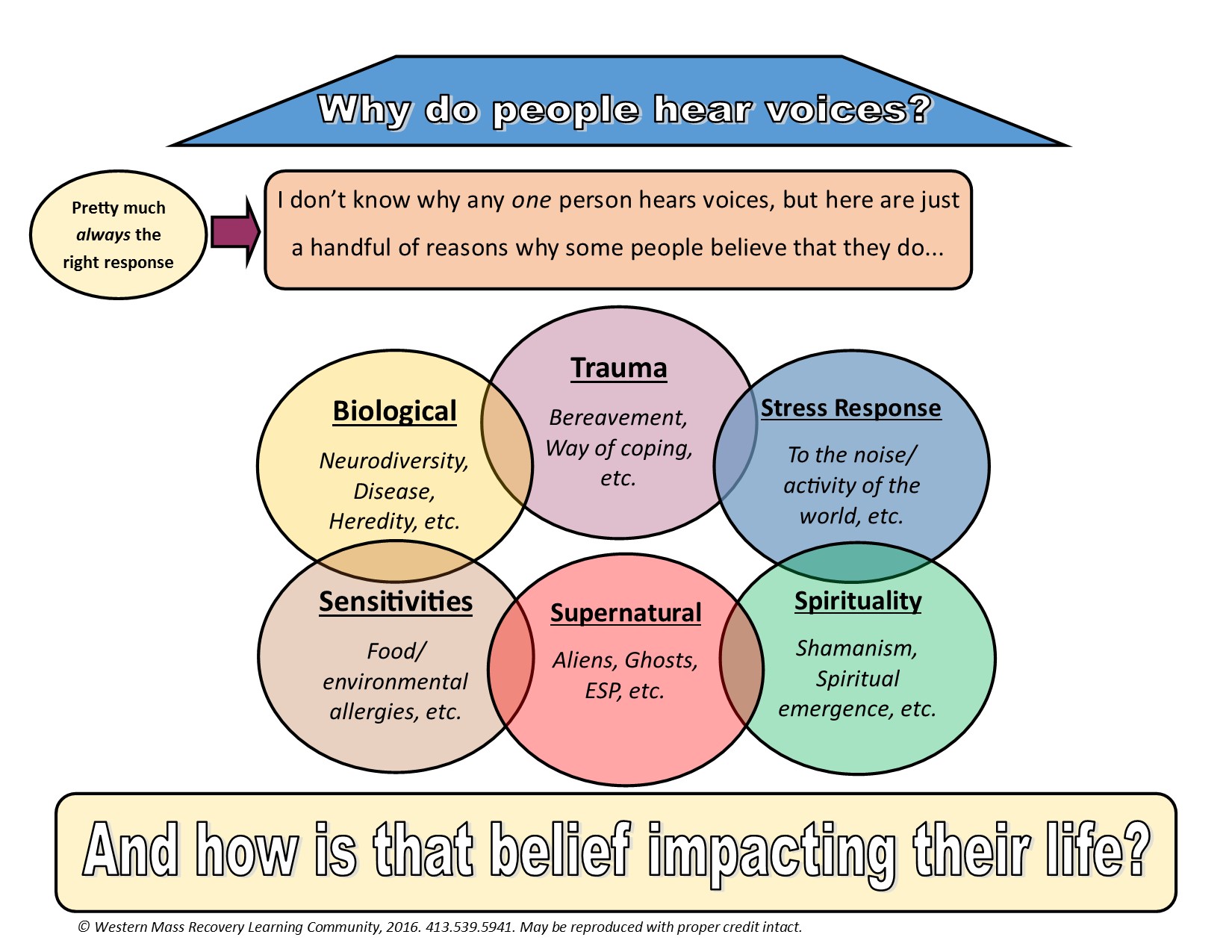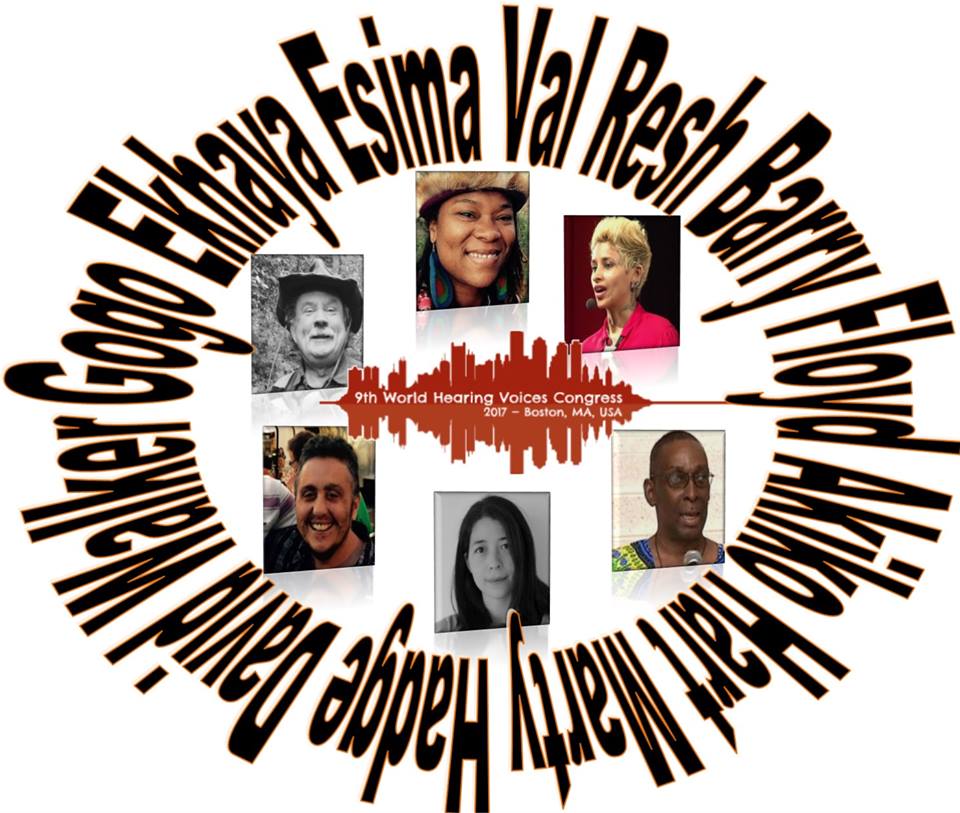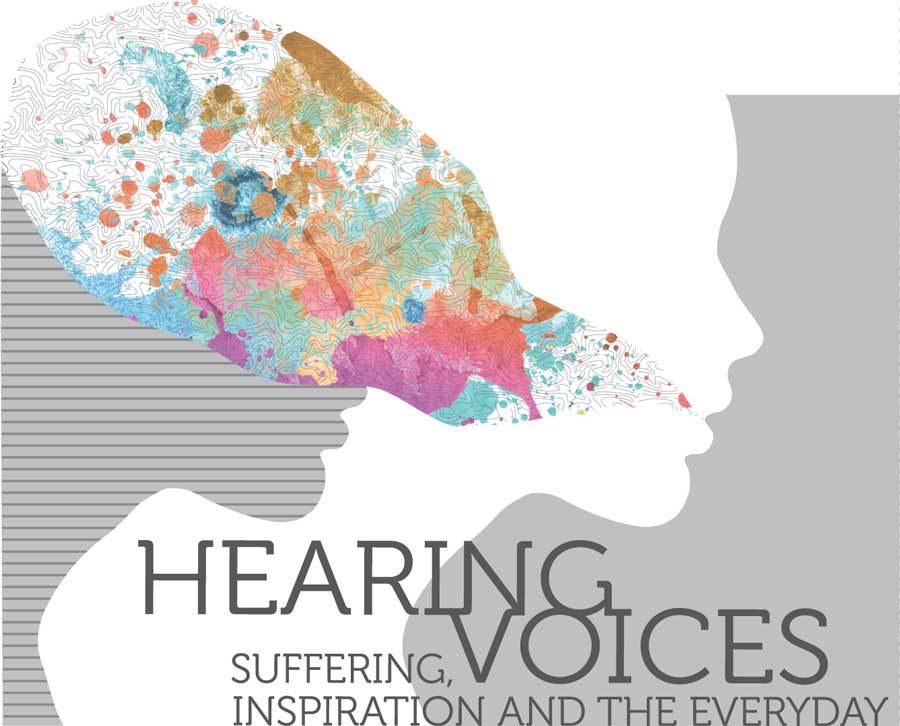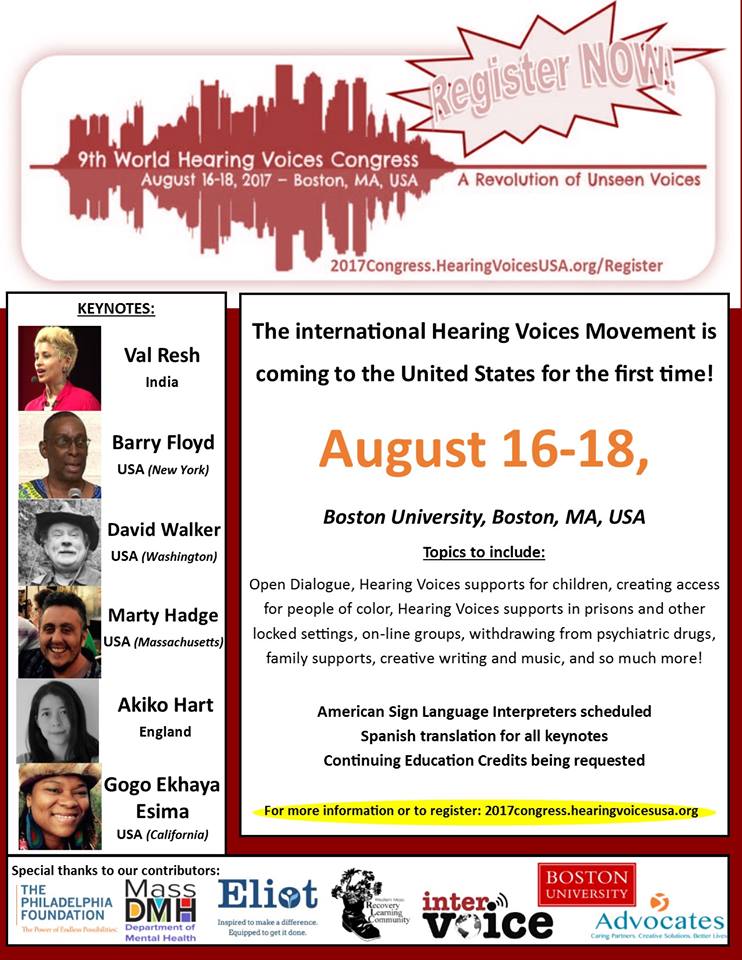Google is my friend when it comes to hearing voices and pretty much any other topic. As I’ve written more and more articles requiring some degree of research, I’ve relied on said friend with increasing frequency. Sometimes my purpose is to find (credible) references for specific information. Other times, however, it’s simply to get a sense of the trends.
While I know that one’s Google results can be affected by geography and a whole host of other factors, the insight offered by what rises up to the first page results (as well as the ‘searches related to’ section at the bottom) can be fascinating. And telling. In my recent NAMI article “Back to Basics: What’s Wrong with NAMI,” I noted that unless you already know what you’re looking for and tailor your search terms in that direction, nothing critical or contrary pops up. Searching on ‘hearing voices’ is a different story.
When I search on +“hearing voices movement” via Google, I’m pleased to say that lots of good stuff surfaces on page one. Hearing Voices USA. The English Hearing Voices Network. Intervoice. A somewhat questionable but could-be-worse Wikipedia piece, written by someone(s) who clearly doesn’t totally ‘get it’ but at least they’re trying. (And the ‘trying’ is new, so I’ll take it. For now.)
The results are mostly similar if I back my search down to the somewhat less leading +“hearing voices.” But, either way, among all the good that surfaces, so does Susan Inman’s “What you’re not hearing about the Hearing Voices movement” in which she misrepresents our work and beliefs in her signature fear mongering, substance-lacking sort of way. When I repeat this search on Bing, same deal. There are also all the ‘Schizophrenia treatment’ links (particularly on Yahoo search for whatever that’s worth). Yet, gone seem the days when anything but a strictly medical perspective is able to be found.
This is a victory. It’s not the sort of crowd-controlling, ‘no bad gets through’ victory that NAMI has found, but it’s big. Even bigger for the fact that this is not a movement that seeks to erase all criticisms, or promote a singular perspective. And perhaps this is what the Susan Inmans and Dj Jaffes of the world have such a hard time tolerating.
I’ve spent years thinking that maybe if I speak precisely enough, that people will hear me when I say I’m not so much wholly against all pieces of the medical model as I am a proponent of truly weighing all the options and evidence and personal knowledge of one’s self. I keep thinking that if I find just the right way to explain — just the right comparison or analogy — that people will understand what I mean when I say that I believe there are people who’ve benefited from some element of all perspectives, but that how we package and push and claim certainty when it’s not ours to claim is the problem.
But here’s what I’ve learned over time: The medical model relies on painting itself as the only perspective. Not just the only perspective worth considering, but (often) the only perspective, period. Thus, if one of the fundamental parts of the medical model is that it is the only model, I guess it follows that challenging that (even within the context of a perspective that says you still get to come to the party, you’re just no longer the only party guest) is apparently about the same as saying it doesn’t exist. Like, if magic doesn’t exist, then maybe Santa Claus can’t either? There’s no apparent room for thinking that maybe Santa Claus could still exist… just in a very different way than we’d previously thought.
No, when a model skews so strongly toward all-or-nothing thinking (hey, isn’t that a ‘symptom’ in some camps?), suggestion of nuance or difference is basically the same as complete denial. To the most devout among us, it can amount to blasphemy worthy of diagnosis all on its own.
Yet that’s where the Hearing Voices Movement lives — in that not so black and white space. This is a movement that represents an alliance between individuals who hear voices, see visions, or have other unusual (or extraordinary) experiences, family, friends and providers. Its origins lead back to the collaborative efforts of a psychiatrist (Marius Romme), a professor (Sandra Escher), and a voice hearer (Patsy Hage). Some of its most fundamental beliefs include:
- No assumption of illness (but no prohibition against an individual believing that for themselves)
- Freedom to interpret one’s own experiences in any way (including or excluding the medical model)
- Acceptance that voices are real (but without defining in any unilateral sort of way what might be causing those very real experiences)
- Acceptance that the goal doesn’t have to be to get rid of the voices (but that it can be if an individual decides that’s what’s most desirable)
- Understanding that voice hearing doesn’t have to be a bad or negative experience (even if it is for certain people some or all of the time)
There’s a basic acceptance that people hear voices for all sorts of different reasons, just  some of which are represented in this handout I made for a former blog, “Why do people hear voices?” This lack of decisiveness isn’t tethered enough to a single spot to suit some medical model disciples. For them, the medical model is like a weighted blanket that makes them feel held, and they get lost in the inherent roominess of the Hearing Voices approach. So they start flinging accusations. But for many of us, it’s precisely that space and flexibility that has led us back to having trust in ourselves and the belief that our lives can be something other than consumed by all this.
some of which are represented in this handout I made for a former blog, “Why do people hear voices?” This lack of decisiveness isn’t tethered enough to a single spot to suit some medical model disciples. For them, the medical model is like a weighted blanket that makes them feel held, and they get lost in the inherent roominess of the Hearing Voices approach. So they start flinging accusations. But for many of us, it’s precisely that space and flexibility that has led us back to having trust in ourselves and the belief that our lives can be something other than consumed by all this.
There are something like 100 Hearing Voices groups now peppered across the United States. This pales in comparison to England which has far more groups spread across a far smaller expanse of land. But we’re headed in the right direction.
In the last year, hundreds of people have been newly exposed to the approach in states like California, Texas, Maine and Georgia. The Hearing Voices Research and Development Fund, administered through the Foundation for Excellence in Mental Health Care by Jacqui Dillon and Gail Hornstein (with training provided through the Western Mass Recovery Learning Community) has begun a collection of surveys that aim to demonstrate not just that Hearing Voices groups are useful, but how and why. (If you’re someone who has attended groups, you can fill a survey out here now by clicking here!)
And most notably, the World Hearing Voices Congress, an international conference entering its 9th year, will be landing in Boston, Massachusetts in August as organized by Hearing Voices USA. It will be the Congress’s first time on USA soil, having been held in France, Spain, Australia, Wales, and other European locales prior to that.
The Congress will be a two-day event (August 17 and 18) featuring six keynotes:
- Gogo Ekhaya Esima (California, USA) also recently featured in the documentary Crazywise
- Barry Floyd (New York City, USA)
- Akiko Hart (England)
- Val Resh (India) also recently featured in the documentary A Drop of Sunshine
- Marty Hadge (Massachusetts, USA)
- David Walker (Washington, USA)
Click here for more details on each keynote!
In the aforementioned spirit of collaboration, opening remarks will be offered by psychiatrist and long-time Intervoice Board member, Dirk Corstens. More than 40 workshops presented by individuals from over seven different countries will cover topics like:
- Hearing voices and young people
- Hearing voices groups in forensic settings
- Writing, music, and other creative pursuits
- Family journeys toward healing and wholeness
- Hearing voices research
- Gender and sexuality
- People of color in the hearing voices movement
- Open Dialogue
- Withdrawing from psychiatric drugs
- And more!
The Congress will also feature two US premieres:
- A Brazilian film, ‘Hearing Voices’ by Bruno Tarpani (who will be present to lead
 conversation after the screening)
conversation after the screening) - The mobile version of ‘Hearing Voices: Suffering, inspiration, and the everyday’ — the first major Hearing Voices exhibit in the world
Intervoice Day will directly precede the Congress on August 16, and is a free event facilitated by Intervoice that includes updates on the progress of Hearing Voices Networks across the world. (For more on the difference between Intervoice day and the rest of the Congress, click here.)
The Hearing Voices movement is up against a lot in this culture where there’s so little tolerance for uncertainty and exploration. This movement, this event, and so many people’s lives depend on all of us to carry this perspective forward.
I hope you’ll consider joining us in August as a part of that effort.
Click here to register, or here for a flyer to share!
















Thanks, Sera. I wish I could attend. Seems you all have a lot of good things going on in the Boston area. My son is in Waltham, maybe some day I can get over and see first hand what’s happening…if only my wife was a little more interested in being activist …sigh…
Report comment
Hope so, Sam! 🙂 Or even more hopefully, this movement will keep spreading across the country 🙂
Report comment
This is just me and my opinion only, but I am personallly afraid to tell anyone that I hear voices ever again after what happened to me. It is one of the main criteria they use to diagnose people with schizophrenia and then justify forced drugging.
I’m conflicted. On the one hand I long for the day when people can openly “come out of the closet” and openly admit to hearing voices and doesn’t have to fear being locked up and forced to take drugs against their will, but on the other hand I don’t think we’re there yet as a society, and the risks of “coming out” about voices are too great for me.
I don’t even tell my parents about hearing voices anymore. They were the ones who were instrumental in getting me locked up the first time, and while I think they know better now, and they know how horrible the drugs were for me, I don’t want to push it with them. As far as they know, I’m no longer hearing voices, and I plan to keep it that way until I move out of their house.
Report comment
epthe,
The Hearing Voices movement definitely isn’t about telling people that it’s safe to come out about hearing voices! It’s definitely understood that that’s a risk for a lot of people. And, at the same time, when people are willing to come out, hopefully they make it a little safer for others to be able to do the same eventually. Totally respect your position, though. 🙂
-Sera
Report comment
I wish them success and I hope someday I can be open about it without fear.
If there is one of those groups in my area, I will try to attend some of the meetings secretly. I won’t tell my parents or cousins about it. It would be nice to talk to some people who understood me again, kind of like when I used to attend group therapy sessions.
But thanks for taking the lead on this and getting the message out there for voice hearers everywhere. Maybe someday there will be acceptance.
Report comment
Nice article. I hope we get a report of the congress.
Report comment
Thanks, John! Hoping to get some report and video! 🙂
Report comment
Great article Sara, in the great need we all have of ‘doing something.’ The very human and normal impulse to do, which the great mystics have always countered with a call to sit and contemplate or meditate upon the nature of being human. Bradshaw sums up this paradox of being human, in his wonderful book ‘Healing the Shame that Binds You,’ by saying, “I reached the point in my life when I had to stop being a human doing and become a human being.”
In this wonderful documentary that you cite ‘A Drop of Sunshine,’ Val talks about this ‘phenomena’ of being, as she rebels against her parent’s well-meaning advice to go for a walk. She also mentions, in analyzing her ‘illness’ as she still perceives it, the low point of functioning when her brain seemed to be stuck in a phenomenological pattern of “yes/no, yes/no.”
In response to this specifically identified lived-experience of so-called brain disease and our experience of psychophysiological dis-ease, I would like to point out the “on/of” or “excitation/inhibition” phenomena of neural firing patterns within the brain, which is energized by our heart-rate variability (HVA) and respiratory sinus arrhythmia (RSA), which can be experientially confirmed through the use of ‘grounding’ meditative techniques, such as vipassana yoga.
Yet, IMHO this paradox of doing and being, is most evident in its paradox form, in our impulse to ‘think,’ where (phenomenologically speaking) we grasp at words within our mind-space, in the same way we grasped at material objects, as infants. With this perspective on the ‘nature of mind,’ most probably why R.D. Laing said:
We are bemused and crazed creatures, strangers to our true selves, to one another, and to the spiritual and material world — mad, even, from an ideal standpoint, we can glimpse but not adopt. We are all in a posthypnotic trance induced in infancy.
While the father of Gestalt therapy said, back in that strange revolutionary decade, the 60’s: Lose Your Mind and Come to Your Senses.
While the Buddhist’s say: stay your impulse to do and make your subject (mind) void, and you will begin to ‘feel’ the nature of your own reality. For as the Buddha said: Words are not reality, only experience reveals the nature of being human.
While the original meaning of the word Apocalypse is: to uncover, reveal.
I am certain though that the political ‘agenda’ of this community will keep fighting the good fight, and following its impulse to do something. While paradoxically assuming that Plato’s allegory of the cave, and the Bible’s hints, allegations, allegories and allusions to the human condition, are nothing more than words.
I blame modern education myself, for initiating all the fine young cannibals into the ritual feast upon words.
While there is, from that fad of self-inquiry, existentialism, the possibility of asking oneself a question that cuts right to the core of being human: I walk and I talk. How. Do I do that?
While not even the Pope or the President can answer this 21st century, crucial existential question.
I have faith though, that in following its natural impulse to ‘do’ this community will lead us to salvation.
How about you?
Report comment
Hi BigPicture,
Thanks for your lengthy and eloquent response. 🙂 I certainly want to believe by ‘doing’, we are leading the way to something different, and in many ways, we see the evidence that we are… And yet, it is all so easily co-opted and then the ‘doing’ can also lead us astray.
-Sera
Report comment
Yet the feminine nature of innate wisdom might if know the truth of the Handmaiden’s tail? How women give birth to history, quite literally, even though they may sacrifice their innate wisdom, upon the altar of an all too adolescent, male ego.
Do we need more politics of experience now, or the sword of insight, that renders our self-protective psychological-blindness, asunder? Are you, in your ‘temporal’ experience of the space-time continuum, a Temple of Cosmic Being?
Imagine, if this community could answer could ask the most important question of humanity, what that would do for the intellectually ‘fake’ notion, that we are simply mad or Ill?
Some youth are now calling out conservative politicians, as Fake-Wits. Must be a current administration inspired phenomena, perhaps?
Report comment
Good one Sera, get everyone to search: Hearing Voices Movement and change Google autocomplete in the process. Well done.
Did it improve after 420 views of this ? HVM was the 3rd suggestion in autocomplete when I tried it.
420 views already I missed alot of people but everyone do the search like 10 times a day for wile till the HVM gets really stuck in autocomplete.
Report comment
Thanks, The_cat. Let’s hope. 😉
Report comment
where can i do some research in this??
Report comment
Hi there,
There’s a growing amount of research available. There’s a fair amount available here: http://www.hearingvoicesusa.org/resources
-Sera
Report comment
Did you read Daniel Smith’s book Muses, Madmen, and Prophets?
The family discovered that their grandfather heard voices and used their input to help! Eg , playing cards.
But his father felt that the voices were a sign of mental illness, and I think killed himself.
I had a wonderful psychoanalytic supervisor, Dr Donald Winnicot, who saved the day, and life, of my patient who became psychotic. He suggested I stop talking and listen to the patient. After a few sessions I began to understand something, and this gradually led to the young man’s recovery.
At the end he thanked me for helping him to feel human.
Years later I came across Dr Winnicot’s paper on the True Self and the False Self, and realized that true therapy must get to the true self to be effective, and hearing voices or thoughts, as well as dreams, is a great way to do this.
De W talked about the need for regression, and I interpret this as a need to get into the right brain, which develops before the left, and picks up the moods of the mothering person before understanding words.
If trauma occurs before verbal memory patients need help with this, or they can have the right brain be a chaotic, demonic id , like Freud described.
Report comment